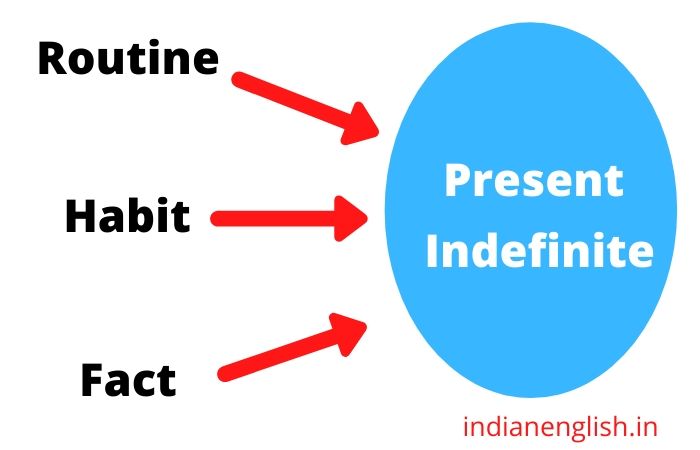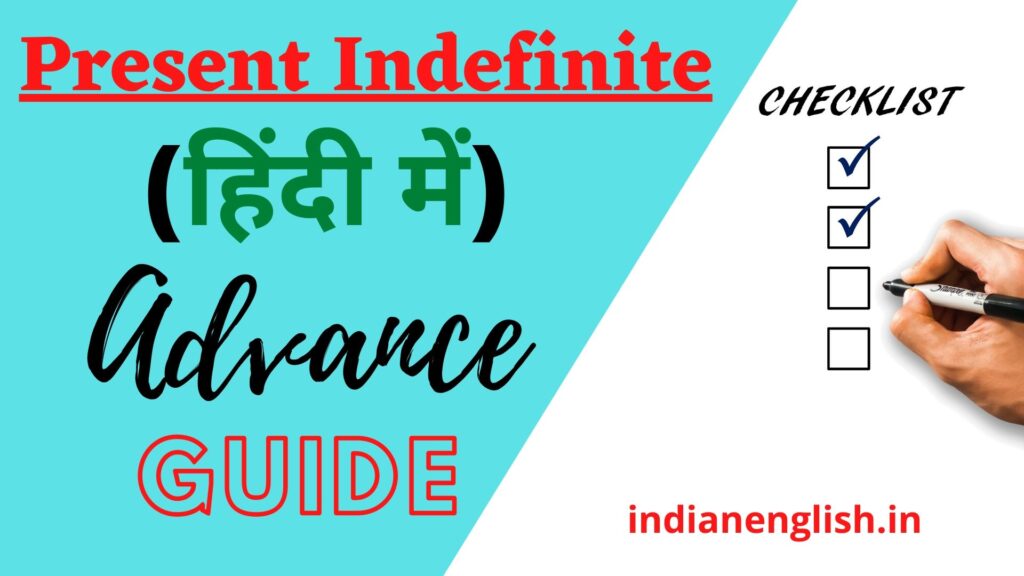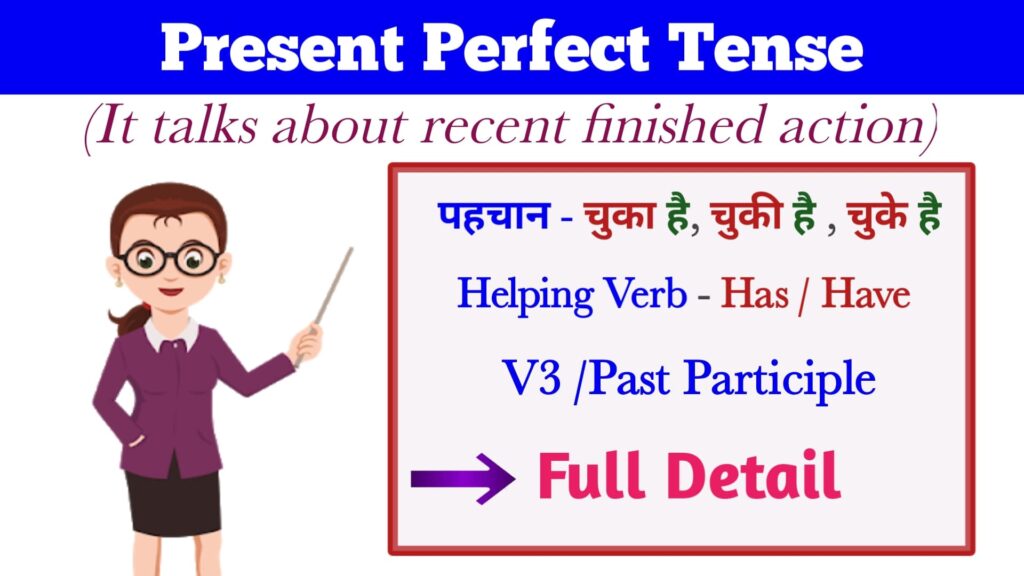Present Indefinite Tense in Hindi: दोस्तों आज के इस आर्टिकल में हम Present Indefinite Tense जिसे Present Simple Tense भी कहते हैं सिखने जा रहे है। Present Indefinite Tense बहुत ज्यादा प्रयोग होने वाल Tense है और ये सभी इंग्लिश सीखने वाले students के लिए बहुत जरूरी है।
तो अगर आपको Present Simple Tense नहीं समझ में आता तो इस आर्टिकल को अंत तक जरूर पढ़े क्योंकि इसको पढ़ने के बाद मुझे उम्मीद है की आपके सरे doubts clear हो जायेंगे।
Present Indefinite Tense Definition
Present Indefinite Tense हमेशा Daily Routine, Schedule, Daily Habit, Facts, की बात करता है और इसके सभी sentences ता है/ ती है/ ते है से अंत होतें है।
For example,
- मैं सुबह 6 बजे उठता हूँ। I get up at 6 o’clock in the morning.
- वो late आता है। He comes late.
- सूरज पूरब से निकलता है। The sun rises in the East.

यहां पहला sentence (यानी 6 बजे उठना) Routine Action, जिसे आप daily routine भी कह सकते हैं, को दर्शाता है। दूसरा sentence (यानी late आना) Habit को दर्शाता है। वहीं तीसरा sentence ( यानी सूरज का पूरब से निकलना) Fact/Truth को दर्शाता है।
Present Indefinite Tense Identification
अगर किसी Hindi Sentence का अंत ता है, ती है, ते है, ता हूँ, ती हूँ, ते हो, ती हो,आदि से हो तो उसे Present Indefinite Tense कहते है
Present indefinite tense example
- वो तेरे साथ काम करता है। He works with you.
- वो लड़की तुझे चाहती है। That girl likes you.
- हम खुद पर भरोसा करते है। We trust on Ourselves.
Present Indefinite Tense Rules
Present Indefinite Tense Affirmative Sentence:
अगर Subject ( कर्ता) He, She, It,या फिर कोई Singular ( एकवचन) हो, तो वहां Verb (क्रिया) में s/es जुड़ेगा।
Subject + Verb with s/es + Object

For Example :
- वो मुझसे डरता है। He scares of me.
- वो रात को जल्दी सो जाती है। She sleeps early at night.
- प्यार में ऐसा होता है। It happens in Love.
- रोहन PUBG खेलता है। Rohan plays PUBG.
ऊपर के Sentences में आपने देखा कि Subject ( यानी He, she, it, Rohan) के साथ हमने Verb के साथ s जोड़ा है। (Scares, sleep, happens, plays)
Note: Present Indefinite Tense में es कहा लगता है ?
अगर Subject (कर्ता), He, she, it, singular हो और Verb (क्रिया) का अंत (o, ch, tch,z, ss,s, sh,x) से हो, तो वहाँ es जुड़ता है।
For Example :
- राम घर जाता है। Ram goes home
- वो बड़े प्यार से मेरे हाथ को touch करती है। She touches my hand gently.
- रिया मुझसे पंगे लेती है। Riya messes with me.
- वो अपनी Bike खुद ठीक करता है। He fixes his Bike himself.
- वो रात को कपड़े धोता है। He washes the clothes at night.
ऊपर के वाक्यों में आपने देखा कि
- Go से Goes हो गया क्योंकि Go का अंत “O” से हो रहा है।
- Touch से Touches हो गया क्योंकि Touch का अंत “CH” से हो रहा है।
- Mess से Messes हो गया क्योंकि Mess का अंत “SS” से हो रहा है।
- Fix से Fixes हो गया क्योंकि Fix का अंत “X” से हो रहा है।
- Wash से Washes हो गया क्योंकि Wash का अंत “SH” से हो रहा है।
अगर Subject (कर्ता) I, We, You, They या कोई Plural( बहुवचन) हो, तो वहां Verb में कुछ नही जुड़ता है।
Subject + Verb + Object

For Example :
- मैं तुम्हे अच्छी तरह जानता हूं। I know you very well.
- हम एक साथ रहते है। We live together.
- तुम हमेशा वादा निभाते हो। You always keep your Promise.
- वो लोग तुम्हारी इज़्ज़त करते है। They respect you.
- राहुल और रवि दिन भर TV देखते है।
- Rahul and Ravi watch TV the whole day.
Present Indefinite Tense Negative Sentence
Present Indefinite के Negative Sentence में हम DO/DOES के साथ NOT का प्रयोग करते है। जिसे DON’T / DOESN’T भी कहते है।
Subject + do/does + not + object
I, We, You, They, Plural – DO
He, She, It, Singular – DOES
For Example:
- मैं आपको नही जानता हूँ I do not know you /I don’t know you

- वह सच नही बोलता है He does not speak the truth /He doesn’t speak the truth
- तुम टाइम पर नही आते हो।You do not come on time/You don’t come on time.
- इससे कोई फर्क नही पड़ता है।It does not make any difference/It doesn’t make any difference.
- वो मेरी बात नही मानती है। She does not listen to me/She doesn’t listen to me.
Note: बोलने वाली English में don’t या doesn’t बोलना सही है पर लिखते समय आप हमेशा do not या does not का ही प्रयोग करें।
एक बात का हमेशा ध्यान रखे कि जब Does का प्रयोग होता है
तो Verb में s/es नही जुड़ता है चाहे Subject ( He, She, It, Singular) ही
क्यों न हो। Verb में s/es केवल Affirmative
Sentence में ही जुड़ता है।
कुछ लोग ये गलतिया अक्सर करते है।
वो तुम पर Doubt नही करता है।
He doesn’t doubts on you.

यहां भले ही Subject, He ( वो,वह) का प्रयोग हुआ है और rule के अनुसार यहां verb में s/es जुड़ना चाहिए, पर क्योंकि ये Negative sentence है और यहां Does का प्रयोग हुआ है, इसलिए यहां verb में s/es नही जुड़ेगा। तो इस sentence को हम ऐसे बनाएंगे
He doesn’t doubt on you.
Present Indefinite Tense Interrogative Sentence
इसे हिंदी में प्रश्नवाचक वाक्य कहते है और इसमें Sentence,” क्या” से शुरू होते है। इसका Rule इस प्रकार से होता है।
Do/ Does + Subject + Verb + Object + ?
Note: Do या Does का प्रयोग हम Subject के अनुसार करते है। जैसे मान लो अगर Subject, He, She, It, Singular हो तो Sentence हमेशा Does से शुरू होगा, और अगर Subject ,I, We, You, They, Plural हो तो Sentence हमेशा Do से शुरू होगा।
For Example :
- क्या तुम फ़ोन चलाते हो? Do you use the phone?
- क्या वो यहां आता है? Does he come here?
- क्या हम एक दूसरे को जानते हैं? Do we know each other?
- क्या राहुल यहां रहता है? Does Rahul live here?
- क्या वो लोग भगवान को मानते हैं? Do they believe in God?
- क्या तुम्हें कभी मेरी याद आती है? Do you miss me ever?
Present Indefinite Tense Interrogative Negative Sentence
ऐसे Sentence, “क्या” से तो शुरू होते ही है पर इनके साथ ” नही – Not” भी जुड़ा होता है। इसीलिए इन्हें Interrogative Negative Sentence यानी प्रश्नवाचक नकारात्मक वाक्य कहा जाता है।
Do/Does + Subject + Not + Verb + Object + ?
For Example:
- क्या अब वो आपसे नही मिलता है? Does he not meet you now?
- क्या आप Non-Veg नही खाते है?Do you not eat Non-Veg?
- क्या वो आपसे प्यार नही करती है? Does she not love you?
- क्या हम आपका ख्याल नही रखते है? Do we not take care of you?
- क्या शिवानी आफिस नही जाती है? Does Shivani not go to the office?
इन Sentences को आप बोलने वाली English में इस तरह भी बोल सकते हैं।
- Doesn’t he meet you now?
- Don’t you eat non-veg?
- Doesn’t she love you?
- Don’t we take care of you?
- Doesn’t Shivani goto the office?
Present Indefinite Tense Wh Family
कुछ ऐसे words होते है जो W या H शुरू होते है और प्रश्न (Question) पूछते है। इनके पूरे समूह ( Group) को ही हम Wh Family कहते हैं और एक को wh word कहते हैं।
- What – क्या
- Why – क्यों
- When – कब
- Where – कहाँ
- How – कैसे
- Which – कौन सा
- Who – कौन
- Whom – किससे
- Whose – किसका
Wh word + do/does + Subject + Verb + Object + ?
आप क्या सोचते हो मेरे बारे मे?
What do you think about me?
वो इतने नखरे क्यों दिखाता है?
Why does he show tantrums?+
तुम्हारा भाई उठता कब है?
When does your brother get up?
मैं tension क्यों लेता हूं?
Why do I take tension?
आप कौन सा किताब पढ़ते हो?
Which book do you read?
Note : Who को हम एक wh word न मानते हुए एक सिंगुलर subject की तरह प्रयोग करते है। इसके साथ हम verb में s /es जोड़ते है और Negative sentence में doesn’t का प्रयोग करते है।
For Example:
कौन कहता है?
Who says?
कौन समझता है?
Who understands?
इतनी रात को फ़ोन कौन करता है?
Who calls so late at night?
ऐसे कौन हँसता है?
Who laughs like this?
कौन फ़ोन नहीं चलता?
Who doesn’t use the phone?
कौन नहीं नहाता?
Who doesn’t take a bath?
आज कल PUBG कौन नहीं खेलता ?
Who doesn’t play PUBG nowadays?
Wh family Negative
Wh word + do/does + Subject + Not + Verb + Object + ?
आप गांव क्यों नही चले जाते है?
Why do you not go to the village?
Why don’t you go to the village?
वो क्या नही जानता है?
What does he not know?
What doesn’t he know?
रिया किसका फ़ोन नही उठाती है?
Whose phone does Riya not pick?
तुम किससे झूठ नही बोलते हो?
Whom do you not speak lie to?
Some Interesting Sentences of Present Indefinite Tense
पता है / आता है/ जानता है

इसे भी जरूर पढ़े
Present Continuous Tense
Present Perfect Tense
Present Perfect Continuous Tense
मुझे अंग्रेजी बोलना आता है।
I know how to speak English.
उसे लॉक तोड़ना आता है।
He knows how to break the lock.
तुम्हे family चलाना आता है।
You know how to run the family.
वो लोगो को बेवकूफ बनाना जानता है।
He knows how to fool people.
मुझे किसी को मनाने नही आता है।
I don’t know how to persuade someone.
तुम्हे झूठ बोलना नही आता है।
You don’t know how to speak a lie.
क्या आपको खाना बनाना आता है?
Do you know how to cook?
क्या उसको bike चलाने आती है?
Does he know how to ride the bike?
लगता है/ लगती है/शुरू कर देता है/ शुरू कर देती है
तुम हमेशा मुझे डांटने लगते हो।
You start scolding me always.
वह रोने लगता है।
He starts crying.
तू टेंशन क्यों लेने लगता है?

Why do you start taking tension?
वह छोटी छोटी बातों पर गुस्सा होने लगती है।
She starts getting angry over trifles.
लगता है /लगते हैं (time के लिए)
मुझे खाना बनाने में 1 घंटा लगता है।
I take one hour to cook.
उसे तैयार होने में आधा घंटा लगता है।
She takes half an hour to get ready.

तुम्हे बदरपुर पहुचने में 15 मिनट लगते है।
You take 15 minutes to get to Badarpur.
तुम्हे Website बनाने में कितना टाइम लगता है?
How long do you take to create a website?
क्या तुम्हें नहाने में 2 दिन लगते है?
Do you take two days to take a bath?
की तरह लगता है/के जैसा लगता है/की तरह दिखता है
तू तो धोनी की तरह दिखता है।
You look like Dhoni.
वो अपने पापा के जैसा लगता है।
He looks like his Dad.
वो बंदर की तरह लगता है।
He looks like a monkey.

लगता है / सोचता हु / मेरे ख्याल से
मुझे लगता है आप पागल हो।
I think you are crazy/mad.
मेरे ख्याल से वो लेट हो रहा है।
I think he is getting late.
उसे लगता है की मै चोर हु।
He thinks that I am a thief
मुझे नहीं लगता की वो आएगा।
I don’t think he will come
तुम्हे क्या लगता है?
What do you think?

More difficult sentences of Present Indefinite Tense
मै चलते चलते थक जाता हु।
I get tired of walking.
वो सोच सोच कर पागल हो जाता है।
he goes mad of thinking.
क्या तुम पढ़ पढ़ कर बोर नहीं होते हो?
Do you not get bored with studying?

Present Indefinite Tense Exercise
- तुम्हे क्या हो जाता है?
- आप कहा खो जाते हो?
- वो आपसे डरता क्यों है?
- आपको मेरा नाम कैसे पता है?
- आप इतना सोचते क्यों हो?
- क्या आपकी उससे बात होती है?
- हमारी आप में पटती नहीं है।
- हम एक दूसरे को अच्छी तरह जानते है।
- आप बात पर मुँह क्यों फुला लेते हो।
- तुम्हे इतना गुस्सा क्यों आता है?
- क्या आप मुझे कभी मिस करते हो?
- मैं आपके बिना कैसे रहता हूँ मुझे पूछो।
- आप जीने के लिए क्या करते हो?
- वो इतना बनता क्यों है?
- मैं सब कुछ आपके लिए ही तो करता हु।
- मुझे मिलना क्यों नहीं चाहते हो आप?
- यहाँ इतना शोर क्यों आता है?
- आप मुझसे चाहते क्या हो?
- तुम मेरे लगते कौन हो?
- ऐसे लगता है जैसे वो मुझे खा जायेगा।
- इसमें आपका क्या जाता है?
- सब मुझे ही क्यों बेवक़ूफ़ समझते है?
- आपको क्या लगता है?
- आप इतना शरमाते क्यों हो?
- तुझे कौन नज़र लगा देता है?
- मैं तुझे अच्छी तरह जनता हूँ।
- क्या तुम्हे खाना बनाना नहीं आता है?
- क्या आपको एक बार में समझ नहीं आता?
मुझे पूरा विश्वास है की ये Article (Present indefinite tense in hindi) आपको Present simple Tense को समझने में जरूर काम आएगा , इसमें प्रयोग हुए सारे Sentences हमारे बोलने वाली English में काम आएंगे। आप इस Article को अच्छी तरह दो से तीन बार जरूर पढ़े और हाँ अगर आपको किसी भी sentence को समझने में दिक्कत आये तो बिना सोचे हमे कमेंट करें। हम आपकी पूरी सहायता करेंगे।
Follow Us on Instagram: @indianenglish011




Good sir ji
This format is very easy to learn English for us thank you so much for that
Pingback: Present Continuous Tense in Hindi with Definition, Rules, Examples - Indian English
Good job sir, you are garet think in Sentences.
Pingback: Present Perfect Tense in Hindi | Present Perfect tense Definition, rules, and Examples - Indian English
Pingback: Present Perfect Continuous Tense in Hindi|प्रेजेंट परफेक्ट कंटीन्यूअस टेंस -
Pingback: Use of feel like in Hindi | Feel like meaning in Hindi - Indian English
Pingback: Future Indefinite Tense Definition, Rules, Example - Indian English
Pingback: Who meaning in Hindi | Who का हिंदी अर्थ - Indian English
Pingback: Tense Chart in English - 12 Tense Formula Chart with Rule - Indian English
Pingback: Who का प्रयोग कहाँ कहाँ होता है?/ Who Meaning in Hindi
Pingback: व्हाट आर यू डूइंग का मतलब / What are you doing meaning in Hindi
Pingback: What If Meaning in Hindi/What if ka Prayog
easy and extensive explaination